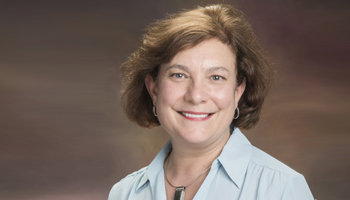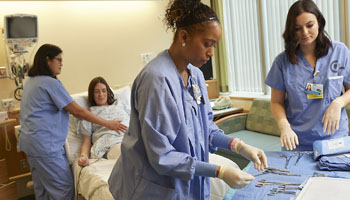HOW CAN WE HELP YOU? Call 1-800-TRY-CHOP
In This Section
Celebrating Nurse Scientists at CHOP: Guest Blog by Margaret McCabe, PhD, RN, PNP

Margaret McCabe, PhD, RN, PNP, director of the Center for Pediatric Nursing Research and Evidence-Based Practice at CHOP.
Editor’s Note: With the World Health Organization (WHO)’s designation of 2020 as “Year of the Nurse and the Midwife,” we are taking this special opportunity to recognize the community of nurse scientists at Children’s Hospital of Philadelphia. Throughout the year, we will feature nurse researchers in a series of Q&As that touch on everything from their research projects to the unique perspective of nurse scientists. To kick off this series, we invited Margaret McCabe, PhD, RN, PNP, director of the Center for Pediatric Nursing Research and Evidence-Based Practice at CHOP, to share her thoughts on the valuable contributions nurse scientists continue to make in pediatrics and beyond.
At Children’s Hospital of Philadelphia, I am proud to lead a community of nurse scientists working in a variety of areas in pediatric healthcare. Our nurse scientists study nurse-driven interventions to reduce the stress of infants with congenital heart disease and their parents, conduct internationally recognized work on human milk and breastfeeding, examine ways to improve nursing practice in clinical research, and so much more. But no matter where we focus our efforts (and often, it’s in multiple areas), there’s one thing that stays the same: our unique, whole-hearted perspective.
Nurse scientists work as both caring clinicians seeing patients and families in a clinical setting, and rigorous researchers asking questions that drive progress and change. The concerns we see in the clinical setting can shape our research, and vice versa: The findings from our studies often shape our bedside practice.
Because our approach to care is family-centered, we’re truly thinking about how to impact the care of children and families from a holistic perspective. We consider the day-to-day experience of patients and their families and consider how to improve those experiences, acknowledging both the physical and mental health (such as stress or anxiety) of children and their parents.

This seamlessness between practice and research is especially true for myself. I began nursing work almost 35 years ago and have been working in a variety of roles in the nursing space, including as a scientist, for almost 30 of those years. In much of my career, my primary role has been in the clinical environment, but engaging with both families and with research has always been important to me.
You can imagine this leads to a number of fruitful and amazing research projects that reflect this holistic approach.
Most recently, some of the work I’ve been focusing on is how to better understand the symptom of fatigue in children from a more holistic perspective. In my research, we use a biobehavioral framework to think about all aspects of fatigue, which means we incorporate not just differences in biomarkers, but self-reported measures, such as asking children about feeling tired, and acknowledge environmental impact, as well.
A longtime focus of my work has been articulating Clinical Research Nursing (CRN) practice. CRN practice seeks to advance the care of research participants by establishing competencies and best practices for nurses involved in clinical research. Most recently, I have developed and disseminated the CRN Scope and Standards of Practice, now the international gold standard; worked with the American Nurses Association to gain specialty practice recognition; and currently, lead development of the CRN core curriculum.
Several of our nurse scientists are also engaging in a project with Martha Curley, RN, PhD, FAAN, Ruth M. Colket Endowed Chair in Pediatric Nursing at CHOP, aimed to inform nursing practice, ultimately ensuring that every nurse at CHOP is practicing at the top of his/her licensure and experience.
As you can see in nursing science, there is tremendous variety in the contribution of nurses, from laboratory work to models of education. With 2020 marking the Year of the Nurse and Midwife, I’m excited to see more of our nurse scientists featured at Children’s Hospital of Philadelphia.
Editor's Correction: This story originally referenced CHOP's participation in the Healthcare Worker Exposure Response & Outcomes of the Hydroxychloroquine Trial (HERO-HCQ); CHOP is not participating in the HERO-HCQ trial.


